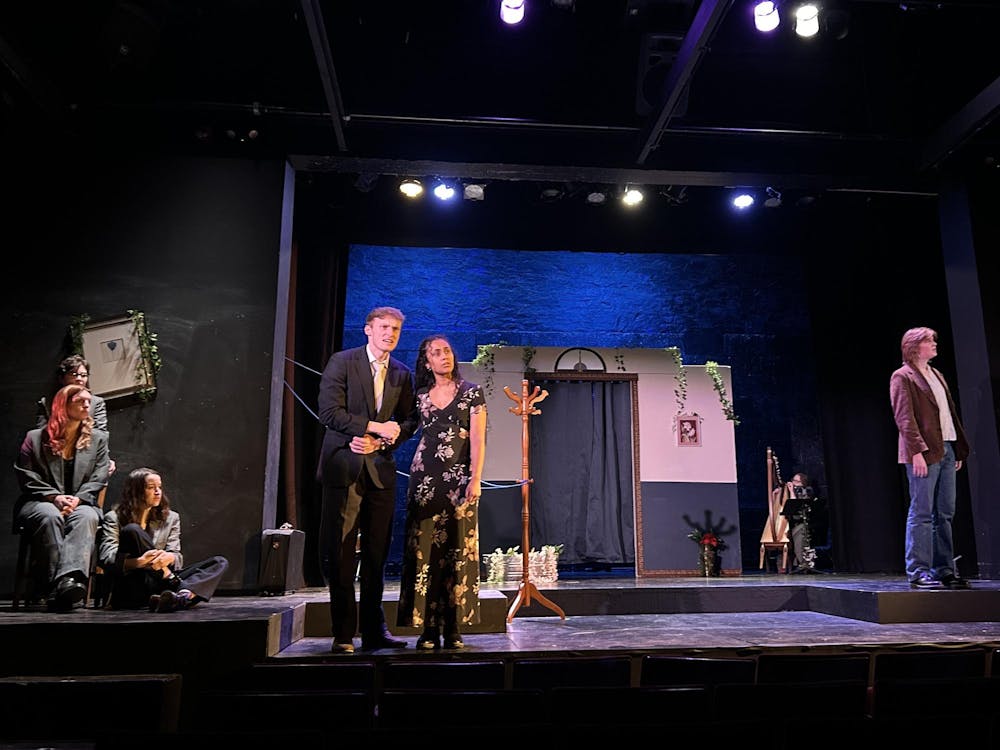The myth of Orpheus and Eurydice has been retold from oral traditions spread through the streets of Ancient Greece to the Broadway stage. From Nov. 15 to Nov. 17, the ancient legend made it to Princeton, this time in the form of Theatre Intime’s production of Sarah Ruhl’s “Eurydice,” a modern retelling of the myth.
The story is known as one of the ultimate tragic love stories: A couple so immensely in love, a bride gone too soon, a widower desperate to get her back, a journey to the underworld, and a doomed and deathly quest. However, to Lucy Shea ’27, the director of “Eurydice,” the great tragedy of the story is not death, but rather forgetting.
“Something that really sticks with me about this adaptation and this play is the way that I think the tragedy isn't really like the dying; it’s the forgetting,” Shea said to The Daily Princetonian. “And I think that’s just a really interesting way to think about death and the afterlife.”
This rendition trades the sweeping romance of Orpheus’s journey for a quieter exploration of memory and grief.
Memory is a theme stressed from the opening scene. The play begins on the beach, with Eurydice, portrayed by Melanie Garcia ’26, and Orpheus, played by Pixley Marquardt ’27. Orpheus, worried that Eurydice will not remember his melody or her love for him, ties a string around her ring finger as a reminder, and a proposal. Garcia’s wide-eyed behavior and Marquardt’s nervous movements combined to display the couple’s childlike wonder to portray the naivety of their love. Their discerning acting choices highlight how authentically human the characters are — unprepared to face the hardships that wait.
The scene then shifts to the underworld, where we are introduced to Eurydice’s father, portrayed by Martin Brennan ’25, who counsels for Eurydice on her wedding that he will ultimately be unable to attend. Brennan’s phenomenal and heartfelt performance sorrowfully captured a parent’s unconditional love and the ache of absence.
At the wedding, Eurydice grieves her father’s passing. The Nasty Interesting Man, played by Jamie Barnett ’26, is then introduced, claiming to have a letter from her father. He lures her to his apartment, where his intentions become clear. Barnett’s performance was masterfully and hilariously unsettling, making the audience feel second-hand discomfort through sheer talent. In an attempt to escape the uncomfortable and dangerous situation, Eurydice reaches for the letter. In doing so, she falls to her death.
In the underworld, three stones guard the realm: Loud Stone, portrayed by Maddie Smoyer ’27, Little Stone, played by Harper Vance ’28, and Big Stone, portrayed by Nell Marcus ’27. The stones explain that now that Eurydice is dead, she will lose her memory, literacy, and language — now only speaking the language of “stones.” The trio and their depiction offered a hilarious insight into the underworld and its rules — adding moments of levity and wit with their sardonic commentary, grounding the underworld’s surrealism with humor that enhanced rather than detracted from the story’s somber themes.

Reunited in death, Eurydice’s father guides her and comforts her as she faces the fear of forgetting. He builds Eurydice a room made of string, a physical representation of their fragile and rekindling bond. The recurring use of string as a prop creates a visual metaphor for connection and memory, suggesting the delicate intricacy of the ties that bind us. Eurydice’s relationship with her father anchors the play emotionally, overshadowing the romantic connection with Orpheus.
Above the underworld, Orpheus mourns Eurydice. Orpheus makes his journey to the underworld, where the Lord of the Underworld, who also happens to be the Nasty Interesting Man, appears — tepidly permitting Eurydice to follow Orpheus back to life, with the condition that he must not look back at her. Eurydice hesitates, torn between Orpheus and her father. In her doubt, she calls out to Orpheus, who turns. She is pulled back to the underworld, finding her father, who, overcome with grief, has erased his memory in the river.
In her director’s note, Shea credits this forgetfulness as the tale’s true tragedy.
“Not only is there a life after death, but there is death after death,” Shea told the ‘Prince.’

Shea’s version of the story emphasized the importance of memories, grief, and childhood. In this adaptation, the naivety of Orpheus and Eurydice’s love reveals the importance of healing your inner child, which Eurydice was able to do when reunited with her father in death. The cast captured this tragic depiction of grief beautifully.
What truly sets this production apart is its ability to make the abstract — memory, loss, forgetting — feel tangible. It reminds us, in Shea’s words, that “holding our memories up as sacred and necessary is how we can survive a journey to the underworld and back.”
Orpheus’s journey to the underworld, depicted not as a grand hero’s odyssey but as a desperate lover’s quiet grief, along with Eurydice and her father’s mutual grief, resonates with anyone who has tried to hold on to what feels irrevocably lost.
“Cherish what you have. Simplicity is beautiful,” Shea said.
Natalia Diaz is a member of the Class of 2027 and a staff writer for The Prospect at the ‘Prince.’ She can be reached at nd6595[at]princeton.edu.








